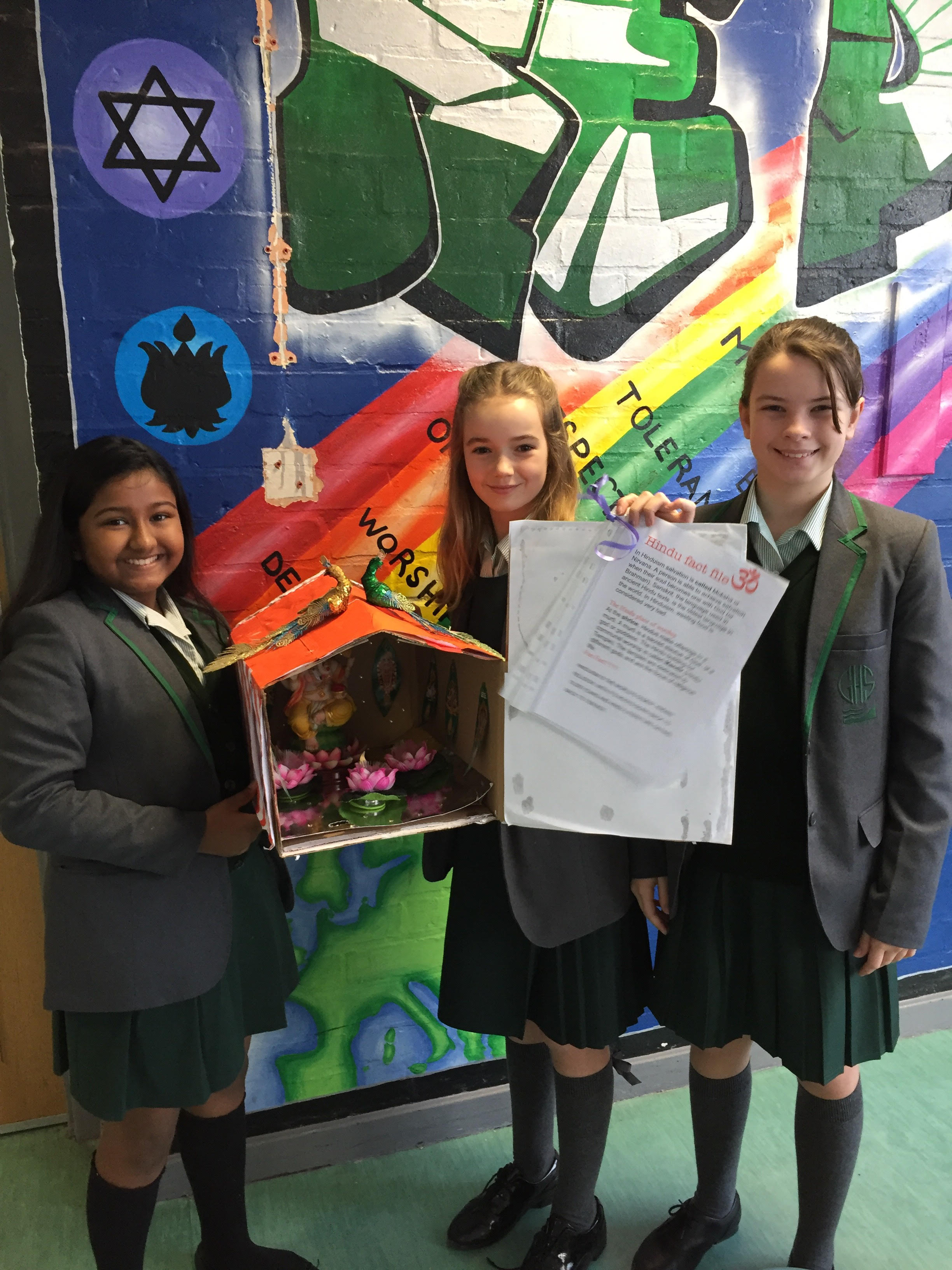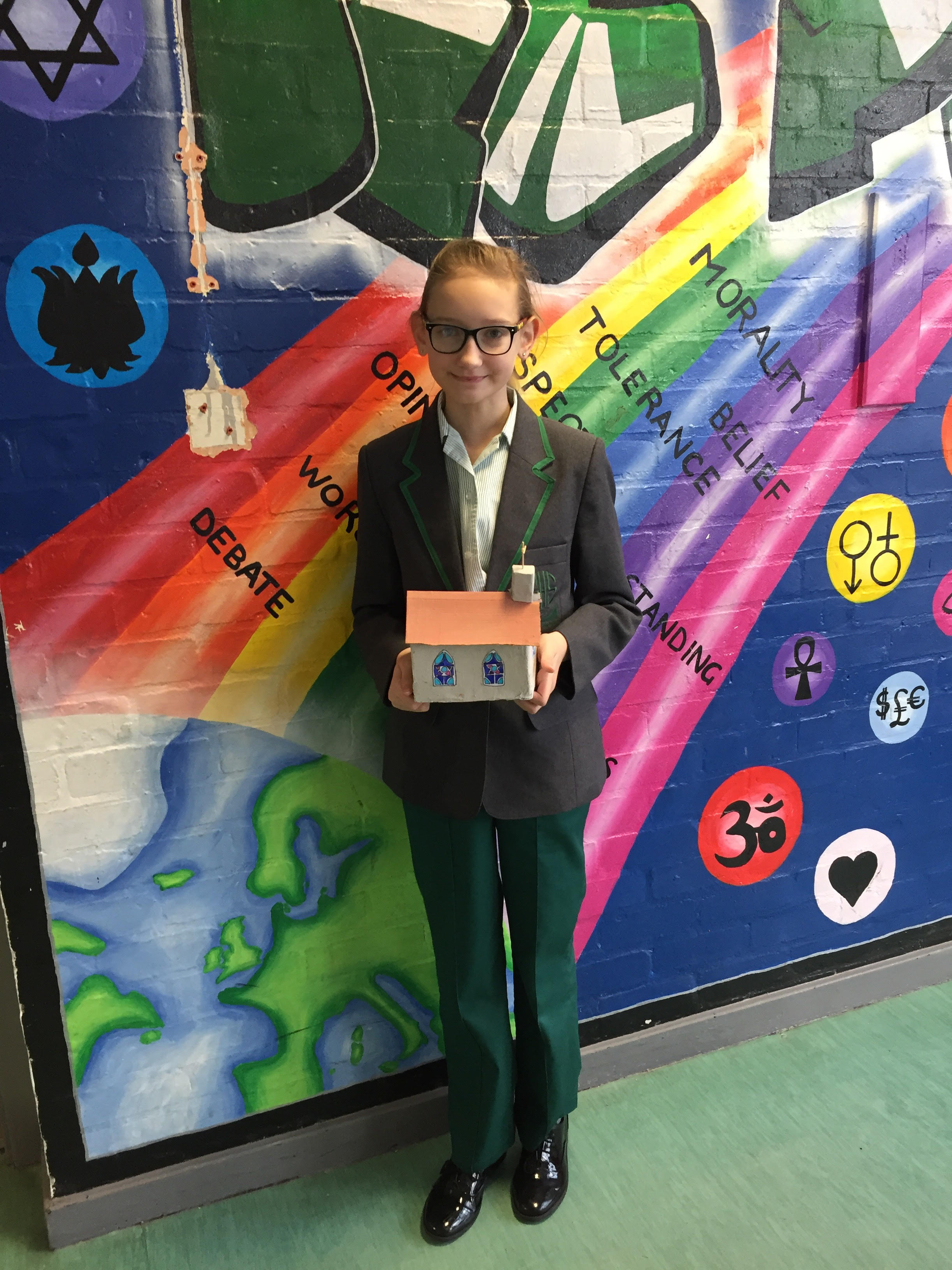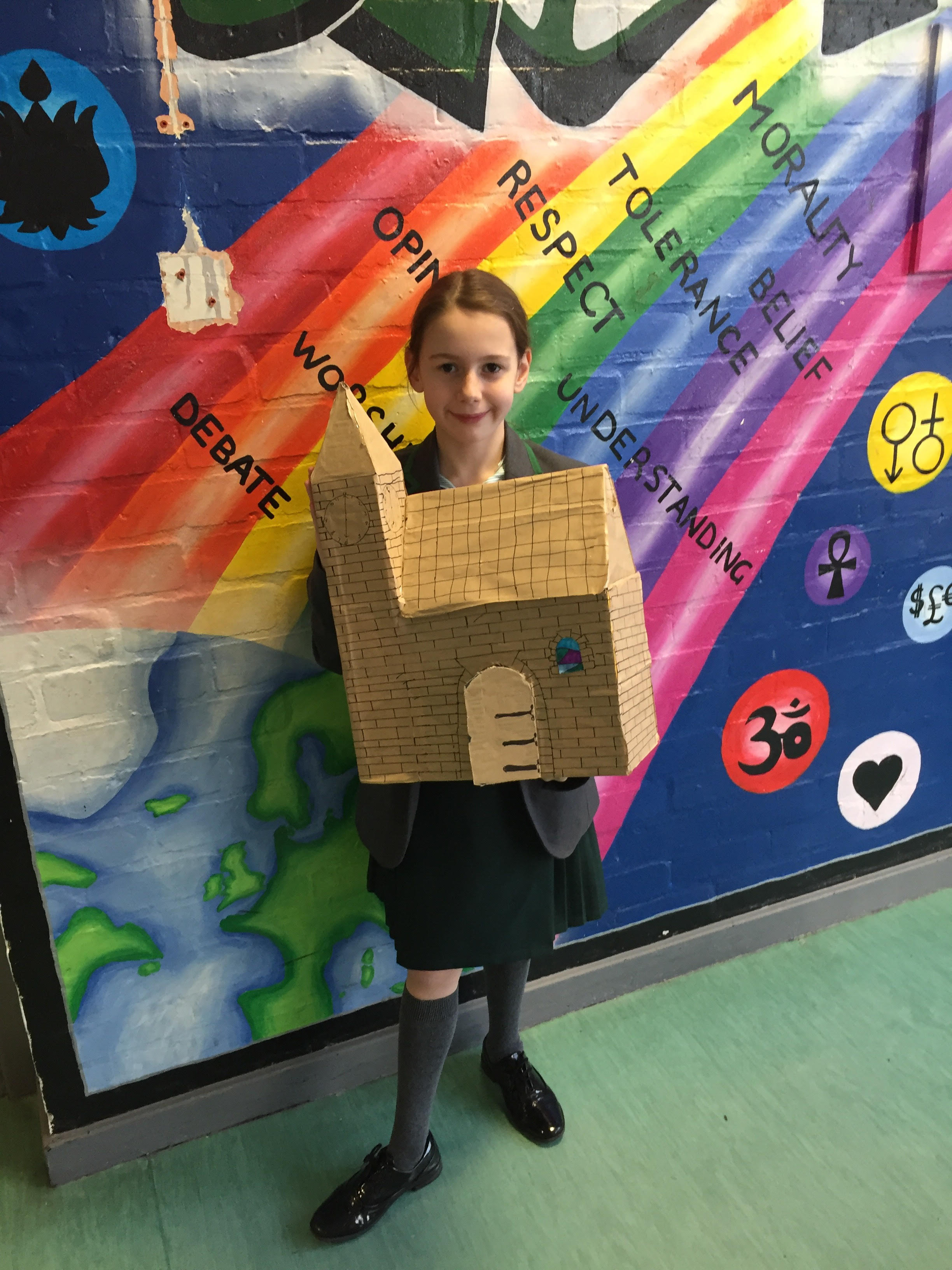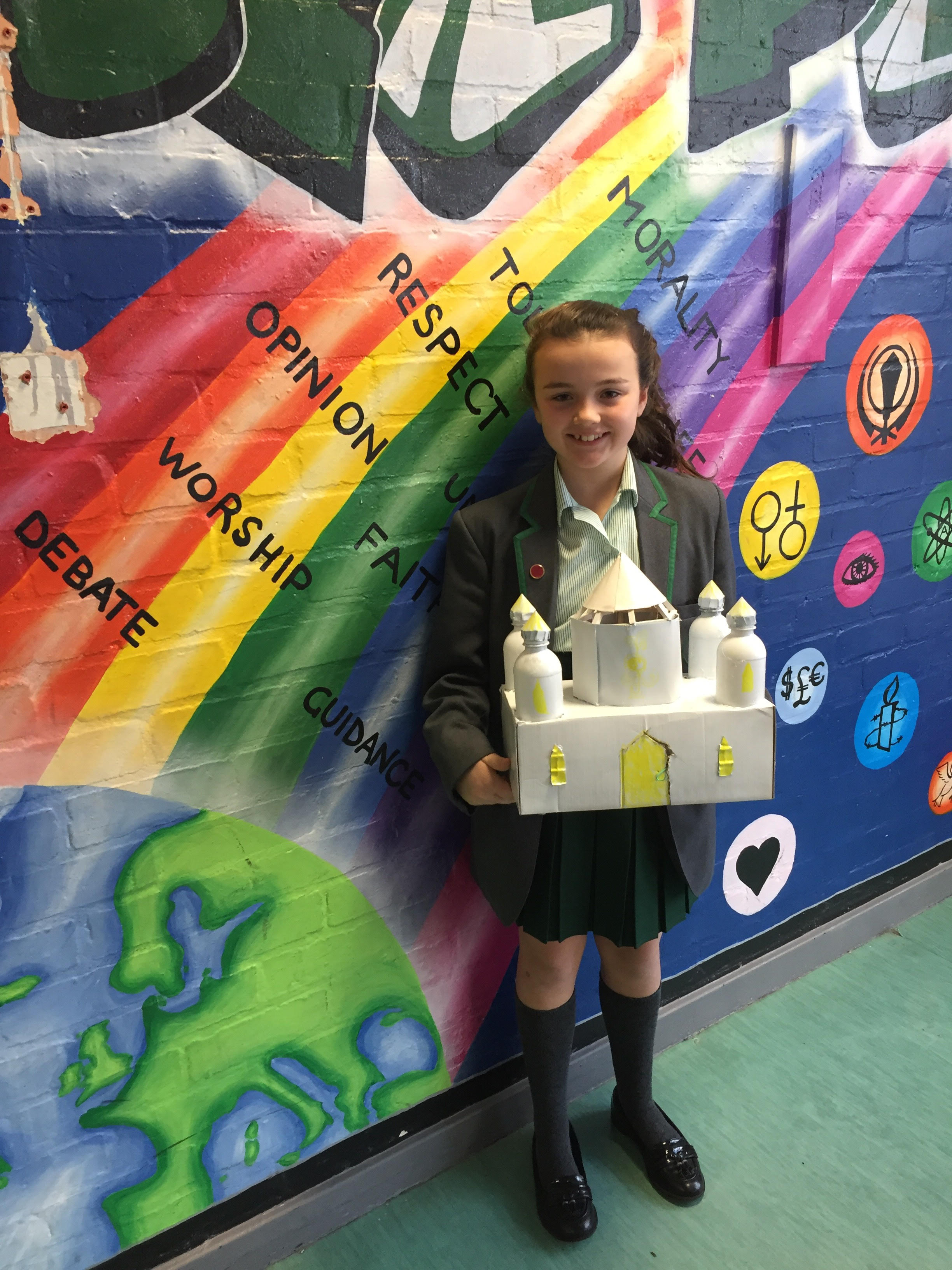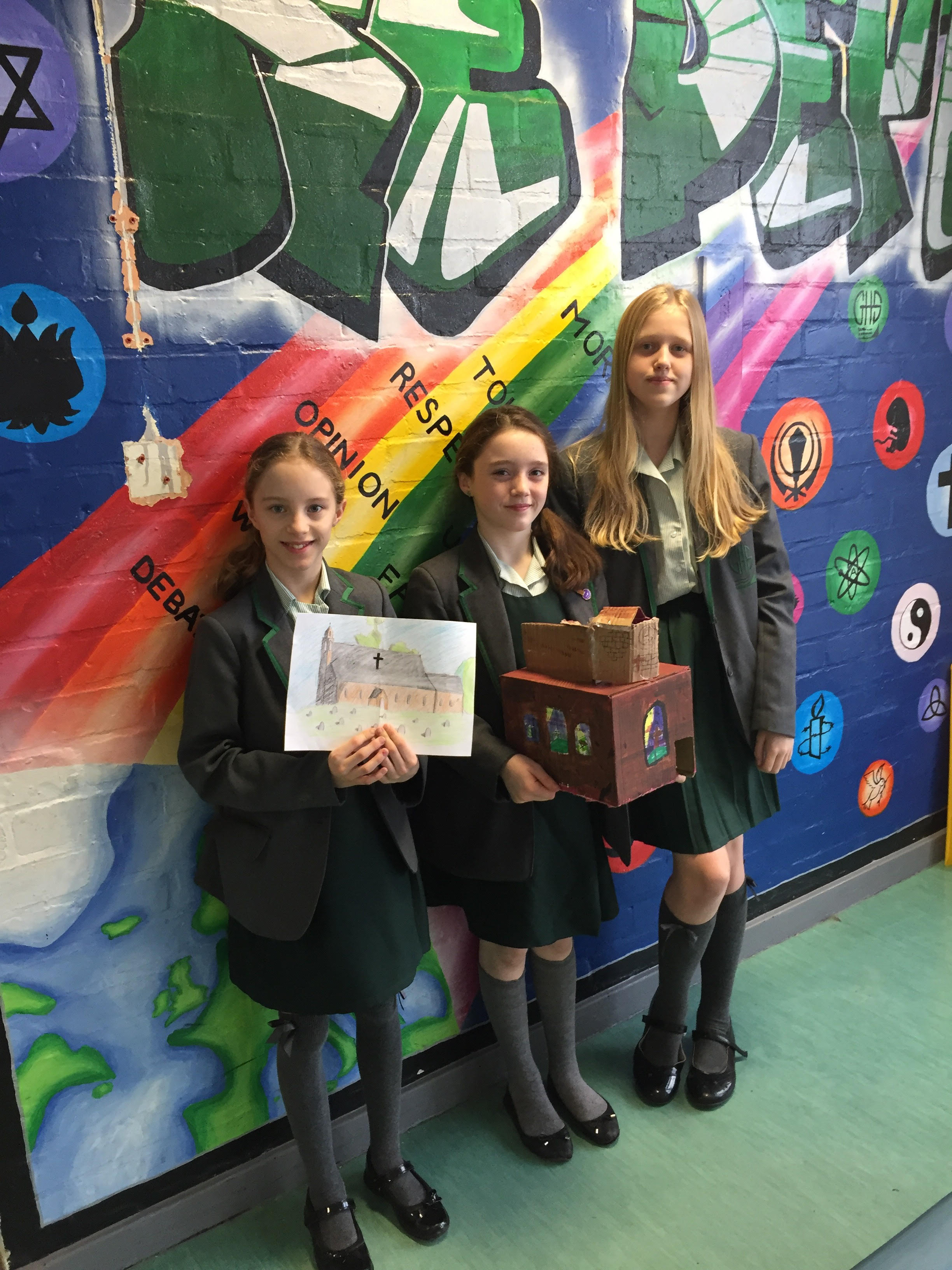CURRICULUM INTENT: VALUES AND VISION
Religious Education (RE) at Greenbank High School aims to develop accurate knowledge and understanding of the six major world faiths, whilst exploring a range of social and moral issues. It aims to instil a sense of awe and wonder into all pupils regardless of their background and provide the chance to share their own personal experiences.
We aim to encourage pupils to think about the world around them, the variety of people in our world and to adopt an open-minded attitude to others they meet within their own communities and further afield.
We believe that RE is one of the richest subjects in the school curriculum – tackling the big philosophical questions in life. As well as developing factual knowledge of moral and religious beliefs, it encourages pupils to ask questions about life and develops attitudes of confidence and thoughtfulness about themselves – skills which are needed to face common issues in the 21st century.
Religious Education at Greenbank High School offers pupils the opportunity to discuss, debate and challenge their own opinions and the opinions of others. It allows pupils to question and reflect on many social, moral and cultural issues exploring the world and society around us.
The climate for learning allows pupils to debate, discuss and ask questions and this is supported by the curriculum exploring the ‘big questions’ about life, self, morality and being. Classroom displays are both informative and purposeful including a range of pupil work, key concepts linking to the curriculum and also exam technique and support.
We aim to empower pupils to ask questions, seek out answers and learn empathy and tolerance. RE encourages philosophical thought, decision making, collaboration and the skills to equip them in the wider world. The UK is a multi-faith, pluralist country and the role that the subject has to be is crucial in helping pupils to understand people around them and to also learn from others within communities.
The teaching staff are passionate and dedicated in their commitment to provide an inclusive and nurturing education. All teachers are Humanities specialists with three being non-subject specialists, however, through shared planning and resources, excellent working relationships and continued CPD in moderation and marking, the team is well established. Pupils are valued for their opinions and encouraged to develop their analytical and critical thinking skills to encourage academic progression.
DELIVERY OF THE CURRICULUM
RE is taught across the curriculum in mixed ability groups. All pupils in Greenbank High School are taught RE and are entered for the GCSE at the end of Year 10. We have no pupils who have been withdrawn from the subject and we are proud of this figure. It displays a real support from parents/ carers and highlights the value that the SLT team share about the RE curriculum.
RE Overview:
| Year Group | Lesson Time Per Fortnight |
| Year 7 | 2 (one hour per week) |
| Year 8 | 2 (one hour per week) |
| Year 9 | 5 hours over the fortnight |
| Year 10 | 4 hours over the fortnight |
| Year 11 (upto June 2020) | 4 hours over the fortnight |
Key Stage 3:
Year 7 and 8 follow the KS3 curriculum using the guidance from the Locally Agreed Syllabus for Sefton (SACRE document 2012). The aim of the schemes of work are to build on their experiences of RE and knowledge and understanding they have acquired at primary school and develop this further. A crucial part of the KS3 curriculum is develop skills needed for GCSE such as evaluation and explanation as well as ensuring that pupils understand the demands of the course. Assessments include the terminology used in the GCSE course so pupils are familiar with this when they reach Year 9. As the SACRE sits alongside the National Curriculum, this is our key document used for ensuring the appropriate content is taught. The main aim of the SACRE document is that pupils are taught beliefs and teachings of the six major world religions and this is mirrored in our curriculum.
Key Stage 3 Programmes of Study:
Year 7
| Scheme of Work | Skills and Objectives |
| What is Religion? | · Links to prior learning for KS2
· Begin to evaluate and share own views and opinions · Link beliefs to the challenges of modern society · Develop a sense of awe and wonder |
| Inspirational People | · Gain knowledge of people who have sacrificed something for others (Malala, Gandhi, Chico Mendes)
· In depth study about the life and work of Martin Luther King. · Develop empathy and understand how our action can affect so many things. |
| What does it mean to be Muslim? | · Recall the 5 Pillars of Islam from KS2 and add in the difficulties for modern day Muslims (school children, sports people etc.) can face when fulfilling their duties.
· Begin to explore the concept of Islamophobia in the UK and around the world. · Cover the foundation elements of the faith to embed the knowledge in preparation for Paper 3 (Islam) of the GCSE course. |
| An Introduction to Hinduism | · Recap basic beliefs of Hinduism from KS2.
· Learn about the significance of festivals and practices for Hindus. · Link the teachings of Gandhi from Inspirational People to debate the idea of a Cate System in the world today. |
Year 8
| Scheme of Work | Skills and Objectives |
| Human Rights and Wrongs | · Introduce the Holocaust and the life of Anne Frank
· Link this to their work in Year 7 about discrimination and persecution (Martin Luther King). · Understanding of animal rights and how the treatment of animals has changed in the UK and around the world. · 9/11 to explore the impact this event had on the world and the view of the Muslim faith. |
| What does it mean to be Jewish? | · Recall Jewish festivals and rites of passage from KS2 curriculum.
· Explore the Jewish faith in the local community and the North West of England. · Evaluate how faith impacts a person’s life choices and key decisions in life. |
| An Introduction to Buddhism | · Understand the origins of Buddhism and the link of the Buddha to the many different branches of Buddhism today.
· Gain insight into the Buddhist faith and how it is different to the other world 5 religions. |
| Sikhism | · Develop knowledge from KS2 about the 5K’s and relate this to everyday practice- for example, how carrying the Kirpan is an issue for most airlines around the world.
· Knowledge about the Sikh concept of giving and charity and comparing this to their own lives and situations. |
GCSE (Year 9 and 10)
| Paper 1 (50%- 2 hour exam)
Philosophy and Ethics |
||
| Unit 1 | Human Relationships | Each unit is worth 30 marks
126 marks total Except Unit 1 (additional 6 marks for SPaG |
| Unit 2 | Life after Death | |
| Unit 3 | Good and Evil | |
| Unit 4 | Human Rights | |
| Paper 2 (25% 1 hour exam)
Study of Christianity |
||
| Unit 1 | Beliefs and Teachings | Paper is worth 60 marks
Additional 6 marks for SPaG |
| Unit 2 | Practices | |
| Paper 3 (25%- 1 hour exam)
Study of Islam |
||
| Unit 1 | Beliefs and Teachings | Paper is worth 30 marks
|
| Unit 2 | Practices | |
Year 9
| Scheme of Work | Skills and Objectives |
| Good and Evil
Good and Evil as a unit is covered first as it is eases pupils in well to the course, sparks their interest and allows them the opportunity to debate and discuss the topics. |
· Explore the concept of morality and how this can be influenced.
· Causes of crime and the categories of this (psychological , environmental and social) · Explore the different types of punishment in the UK and around the world. · Debate the argument of the use of the death penalty around the world. · Challenge beliefs and opinion by discussing why suffering occurs. |
| Relationships
Now groups/ expectations are established we feel it appropriate to complete unit 1. This is not introduced immediately as some topics included are of a sensitive nature and teachers need to know their classes and pupils well (issues such as homosexuality and same sex marriage). This also ties in well with the PSHE course teaching contraception around the same time it is covered in RE.
|
· Family life and the different types of families.
· Discuss the changing roles of family members and how traditional views have changed. · Marriage- looking at this from religious viewpoints, non-religious viewpoints and also interfaith marriage. · Explore the reasons for divorce and the key idea of reconciliation. · Understanding of the types of and use of contraception and linking this to the religious opinions. · Debate the rights of women exploring the laws in place in the UK and the role of women within the Church. |
| Islam
With 2 of the Philosophy units completed, pupils now change their focus to study a world religion. Islam was chosen as it is current and very often portrayed by both media and society in a negative way and we aim to tackle some of the misconceptions. Pupils are also maintaining their engagement by exploring something very new to them. |
· The content is divided in the exam paper into 2 sections: Beliefs and Teachings and Practices. We deliberately do not separate them in teaching as so many overlaps of knowledge and links within the content occurs. Pupils do know however, how the exam is split.
· Reference back to Year 7 to recap the 5 Pillars but link it now to how this would/ could impact on a Muslims life and decisions that they make. · Tackle the misconception of Jihad and what the term actually means for Muslims. · Explore terrorism and Islamophobia using media sources such as news clips and papers to show this is portraye. |
| Human Rights
By this point, pupils are more aware of the GCSE exam question demands and so are more familiar with how to use the different religious views in their answers.
|
· Link back to Year 8 topic- Human Rights and Wrongs.
· Poverty and wealth in the UK and around the world including research of national and global charities. · Recall key concepts of prejudice and discrimination- study in Year of Martin Luther King and introduce concept of personal conviction.
|
Year 10
| Scheme of Work | Skills and Objectives |
| Issues of Life and death
This is officially unit 2 of paper 1 but due to the topics included in the programme of study it is more appropriate that this is left till Year 10 as pupils are more mature and more aware of the issues we are to debate and discuss.
|
· Exploring differing views about how the world was created- looking at both the religious and scientific beliefs.
· Abortion and euthanasia- arguments for and against the medical issues focusing on the skill of evaluation. · Sustainability and stewardship- human’s role on the earth. · Concept of heaven and hell, reincarnation and the afterlife. |
| Christianity: Beliefs/ Teachings
The least amount of time is needed for Paper 2 as it is the topic that pupils generally have some background information on. We follow this from life after death as we link it to the life and death of Jesus. |
· Jesus’ life- atonement, resurrection, crucifixion, ascension.
· Exploring the key beliefs of differing denominations within Christianity. · Linking nature of God to Islam- comparisons that can be made between the two faiths. · Exploring the sacraments and referring back to thir Place of Worship Enrichment Day and the focus was sacraments at the 3 local Churches that were visited. |
| Christianity: Practices
Shortest content of the course and fits well into the short term of Jan-February half term to allow for revision to begin after February half term.
|
· Worship and the different forms of it.
· Discussing their understanding of prayer as a general concept and then challenging pupils to thin more deeply about this. · Debating the role of the Church in the local community and the relevance of the Church in the 21st century. |
Pathway/ Links to KS5
Two local Sixth Form Colleges that Greenbank has positive links offer the subject area as an A-level course. KGV offers A-level Philosophy. The course content is a continuation of what is studied in paper 1 with a greater depth but feedback from pupils is that they feel prepared for the course through the Eduqas exam specification. Runshaw College offers both A-level Philosophy and A-level Religious Studies, Theology and Philosophy. Both courses contain the same units that are studied in the Eduqas GCSE specification. A member of the department has also been employed by Edge Hill University as a link tutor for the RE department so will bring insight into the further education of the subject and how we can continue to support pupils with their knowledge and understanding.
A successful pupil in RE is inquisitive about the world in terms of social, cultural and moral ideas. They will have an up to date knowledge of current affairs and keen to discuss and debate the issues surrounding our world.
High levels of literacy would also be evident in written work as well as the ability to full evaluate showing reasoning for different points of view. They would be able to explain how ideas and beliefs can be interpreted differently and annotate sources of wisdom and authority accurately.
More able pupils in RE look at the world in awe and wonder seeking out answers to ultimate questions. They would ask philosophical questions and question teachings from religious texts and scriptures.
Curriculum Provision
As some of the topics covered at KS4 are of a sensitive and emotive nature (including euthanasia, abortion and death) the sequencing of the programmes of study is in place to support this. With the GCSE course being covered in Year 9 and 10, it is ensured that the topics of this nature are only discussed in Year 10 where we feel the level of maturity and understanding is of a higher capability. The sequence of the topics has been explained in the course content but it is important to highlight that professional judgement and department discussion over the long term planning has taken time and has changed where necessary.
Developing the skillset of pupils has also influenced the sequencing of content to ensure that knowledge and understanding can be built upon and the focus for the unit is mainly grasping of content (if for example it is Islam which is often new information) or exam skill focussed (if for example it is relationships where pupils tend to have general understanding and knowledge).
The specialist skillset of the RE department is also crucial for this element of the curriculum provision as discussions about family, prison, abortion, funerals etc. can and do impact many of our pupils and how this is taught and explained is important as well as creating a classroom environment of respect and security for those who want to share their own personal experiences.
Tailoring the provision for all pupils regardless of ability and background is paramount and this is addressed through quality first teaching and other strategies such as:
- Seating Plans- premium seating (PixL) in all RE classrooms using the whole school strategies for both MAGT and disadvantaged pupils.
- Extension work within lesson plans and schemes of work. This is utilising the wall display with a variety of tasks to test pupils general RE knowledge or for them to develop their skill set in preparation for exams. We offer pupils specific extension tasks explicitly on the PowerPoints and worksheets across the curriculum.
- Pupils have 3 separate exercise books- Paper 1, 2 and 3. This assists with their organisation skills and is invaluable for their revision for exams. Pupils have a folder for all their books to be kept and also to allow a safe place for assessments, feedback sheets and extra revision tools designed for pupils.
- Development of own beliefs and views encouraged by all pupils.
- Differentiated homework tasks- beginning at KS3 through to GCSE.
- Scaffolding of GCSE practice questions to support LA pupils.
- Challenge task board in RE classroom to promote stretch for MA.
- Targeted questioning- to ensure we are pushing MA and supporting LA.
- The books of disadvantaged pupils are marked first and staff are encouraged to take extra time when needed in feedback.
- Promotion of independent learning.
- Pupils all complete key concepts tests (spelling and definition tests for each unit of work).
- Revision strategies- Revision clocks, mind maps, past paper questions, flashcards- suggestions and examples available on Firefly.
- Teachers check that the curriculum has been learned through a variety of assessment for learning as outlined in the assessment calendar.
Assessment Calendar:
The assessments aim to include a variety of tasks to allow for pupils variety of key skills to be used and evidenced. KS3 are banded (Platinum, Gold, Silver, Bronze) and KS4 are GCSE graded (9-1).
| Autumn Term
(September – Christmas) |
Spring Term
(January – April) |
Summer Term
(April – July) |
|
| Year 7 | Baseline Test
End of Unit test What is RE? (PIP 1) Inspirational people speech
|
GCSE Practice Question- Islam
Hinduism end of unit test (PIP 2) Homework |
End of Year Test (PIP 3)
End of unit test
|
| Year 8 | GCSE Practice Question- Human rights (PIP 1)
End of Unit test What does it mean to be Jewish? Homework |
GCSE Practice Question- Religion and the media
Homework End of unit test- What is belief? (PIP 2) |
End of Year Test (PIP 3)
End of unit test |
| Year 9 | GCSE Paper- Good and evil (PIP 1)
GCSE Paper- Islam Homework
|
GCSE Paper- Christianity
GCSE Paper- Relationships (PIP 2) Homework |
Mock exam paper (PIP 3)
Walking talking mock Homework |
| Year 10 | GCSE Paper- Human rights (PIP 1)
GCSE Paper- Good and evil Homework |
GCSE Paper- Christianity (PIP 2)
GCSE Paper- Islam Walking talking mock
|
Mock exam paper (PIP 3)
Walking talking mock Homework |
| Year 11 | GCSE Paper- Human Rights (PIP 1)
GCSE Paper- Islam Walking talking mock Mock 2 papers PPE
|
GCSE Paper- Islam (PIP 2)
GCSE Paper-Life and death Chrisitianity |
Paper practice
3 summer exams |
CULTURAL CAPITAL
Our school is committed at every stage to ensure that no pupil is disadvantaged because they do not have the cultural experience to access the full curriculum and within Religious Education the following key areas are developed:
- A love of the subject and a love of learning.
- The department faculty develop careers provision and aspiration by discussing at GCSE the variety of ways a philosophy qualification may be of use. It is also in development to devise a Careers Board for the RE department to make some explicit links for pupils.
- Year 7 Enrichment Day- Places of Worship trip to 3 different local Churches. The whole year group take part and walk to each of the Churches.
- Teaching pupils a tolerance for and an appreciation of the justice system and its response to theological ideas and religious beliefs surrounding issues covered on the GCSE such as medical ethics and law and order.
- 100% of the school cohort participate in the RE curriculum with no withdrawal of pupils from parents.
- Participating in an RE education study with Liverpool University, this was all of Year 9 pupils. Questionnaires completed about the current RE provision completed by parents and pupils. We are awaiting the feedback from the University to inform our curriculum where appropriate.
- Providing pupils with a knowledge of geographical influences on religion and faiths across the globe.
- Tackling Islamophobia and its place with the media and to explore the consequences on autocracy and propaganda suffered by various religious groups over the years.
- For both KS3 and GCSE, the units of work have been re-ordered to equip pupils with the knowledge, understanding and skillset to access the GCSE content.
- Islam has been introduced to the Year 7 long term planning to cover the fundamental beliefs of the religion to give a foundation of knowledge for the GCSE course.
- Baseline within RE is crucial as GHS gains pupils from such a variety of feeder schools- some of faith and some have covered very little RE. Feedback from this allows us to tailor the introduction topic ‘What is religion, belief and faith?’ to suit the skillset of the pupils.
- Through quality first teaching, we are aiming to develop skills over time equipping fully for what is required at GCSE level and beyond.
- Being part of the Yr6 (new Yr7 cohort) transition day to deliver an RE session for pupils and have dialogue with them about their RE experience so far.
- Taking into account age relevant and appropriateness due to some of the topics covered in the RE syllabus being of a sensitive nature and would need pupils to be of a certain maturity level when covered.
- Differentiation of tasks and skilled questioning allows all pupils to access the content of the course.
- Introduction this year of half termly spelling tests for Yr7-Yr9. Focussing on both subject specific terminology as well as useful English vocabulary that will assist them in their writing. They are given to pupils in advance and printed for workbooks.
- Key word displays are evident in the RE teaching rooms and referred to in lessons.
- Encouraging reading to each other, to the class and to themselves. Tasks including comprehension feature heavily at GCSE.
- Analysis of census data and graphs of major religions around the world are examples of how mathematics is used in RE. There are also percentages, ratio and graph interpretation that are used within the RE curriculum.
Extra-curricular Opportunities:
- Philosophy Club
- Poland trip to Krakow
- Study support sessions
- Young Citizens Mock Trial Competition
- Different faiths Christmas assembly
- Enrichment Day- Year 7 visit to 3 local Places of Worship
- Trip to Parliament
- House Quiz- Focus on world religions and practices at Christmas
As we teach about equal rights, fairness and supporting others, it is very important for the department to be a beacon of inclusion. As previously mentioned, we enter all pupils for the GCSE and teach across a range of abilities, faiths and backgrounds.
Supporting pupils to offer them opportunities through media, discussion and sharing of own experiences they get a taste of what is around them and open to them in their futures.
PERSONAL DEVELOPMENT
The personal development curriculum embraces the strands of Citizenship, Personal, Health and Social Education (PHSE), Careers Education and Guidance (CEAG) and Spiritual, Moral, Social and Cultural (SMSC) educational policies.
In Religious Education, the personal development of pupils is supported in a vast variety of ways. The Subject Leader for PSHE is within the RE department so is able to closely link topics and marry up schemes of work across the two subject areas. It is also ensured that during Enrichment Days where topics such as British Values, consent, tolerance and disability are covered that this is staffed appropriately and very often led by the RE department based on this niche skillset.
RE encompasses the key elements of personal development in the following ways:
Spiritual Development:
| Focus | Scheme of Work |
| Reflect on own beliefs | Year 7 and 8 study of world faiths
GCSE- Skill of evaluation and relating different faith points to own personal views. |
| Gain perspective of different faiths | World religions studies (all 6 major world religions taught at KS3).
In depth study of Christianity and Islam at GCSE. |
| Imagination and Creativity | Inspirational People- devising of own speech about what pupils would like the world to be like.
Building of a place of worship project. Poems and artwork when studying Hinduism. Music and lyrics discussed that have religious links. |
| Creating a fascination with the world around us | Discussion and debate of all topics allowing freedom to ask questions and share own personal experiences.
Exploring practices in different cultures (Halal, Kosher, shrines, pilgrimages, arranged marriages etc.) |
| Develop a sense of awe and wonder | Creationism and design argument- Life after Death Unit.
Beauty of the world around us- natural and human morality. Inspirational People- What pupils feel they can take away from the beliefs and work of these individuals. |
Moral Development:
| Focus | Scheme of Work |
| Morality- right and wrong decisions | Crime and punishment (Good and Evil Unit) to explore personal morality of different situations.
Psychological, social and environmental causes of crime |
| Gain an understanding of the consequences of our actions | Exploring arguments for and against the death penalty.
Aims of punishment in the UK. Forms of punishment in Britain and the laws in place. |
| Moral and Ethical issues viewpoints | Abortion and Euthanasia- Life after Death Unit.
Forgiveness and retribution- Good and Evil Unit. Marriage, divorce and cohabitation- Relationships Unit. Use of animals and animal rights in the UK and worldwide- Human Rights Unit. |
| Civil and Criminal Laws | Law and order- Good and Evil Unit.
Laws across many topics such as abortion acts, animal welfare, food laws for Muslims and Jewish people, crime rates in the UK and use of money (taxes etc.) |
Social Development:
| Focus | Scheme of Work |
| British Values | Throughout the KS4 GCSE course, this is discussed, debated and ensured that pupils are aware of what is meant by British Values.
KS3 explores the world we live in and the link to British Values. This is explicit on some of the lessons that are taught across the curriculum. |
| Resolution of conflicts | Peace and justice- Corrymeela as a prime example of local agenda for the UK.
WWII- Ann Frank in depth study explores the reasons for persecution of the Jewish population. Hiroshima- Looking at the story of ‘A Thousand Cranes@ and reflecting on the individual story. Jihad and Holy War. |
| Tolerance in modern Britain | History of 9/11- looking at the change in the world’s view of faith especially the term of Islamophobia.
Understanding of practices of world faiths within our community and nationally. Christmas assembly led by some pupils from different faith backgrounds to share their own personal experiences. |
Cultural Development:
| Focus | Scheme of Work |
| Appreciation of cultural differences within school | Welcoming of pupils to share their own experiences. This has included Year 11 pupils who are practising Muslims to teach the class about their faith and beliefs. Another example of a Year 8 practising Hindu to discuss her personal experiences of faith. |
| Diversity of different faiths | Ensuring that the KS3 curriculum builds on the programme of study at KS2 so pupils have a sound foundation about all 6 world faiths and know some key practices and beliefs of all. |
| History of society | WWII- Anne Frank and the Holocaust.
Abolishment of practices such as the death penalty, abortion being made legal, same sex marriage and laws pf divorce. |
| Local, National and Global settings | Linking where possible the local faith communities, exploring different faiths of the UK and developing a clear understanding of the main and less well-known faiths from around the world. |


